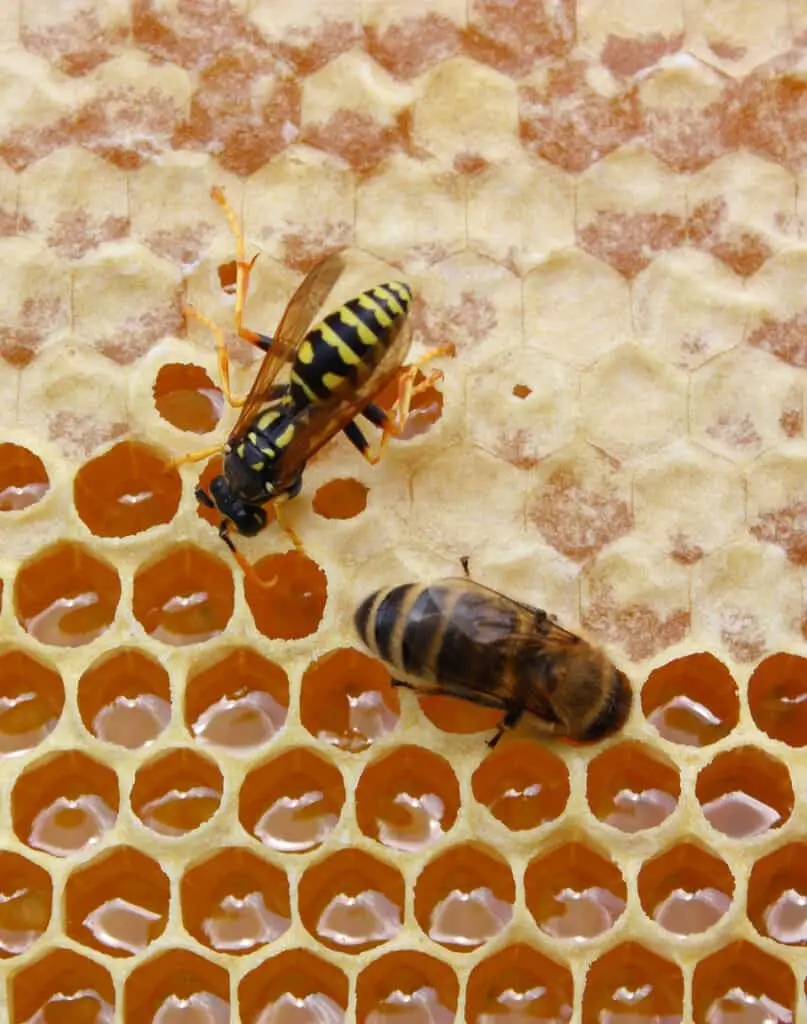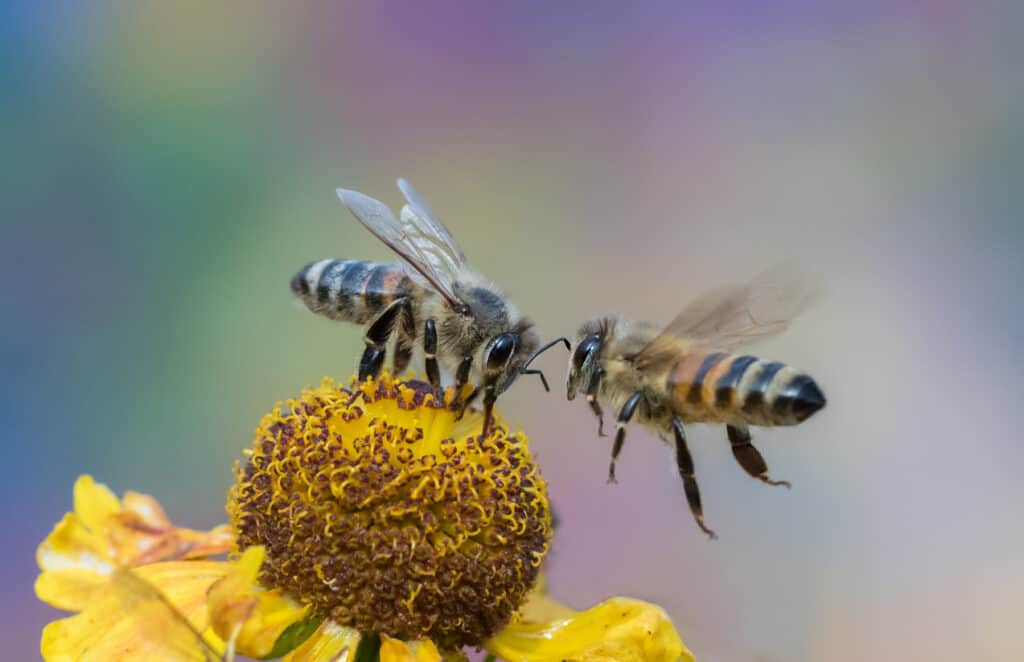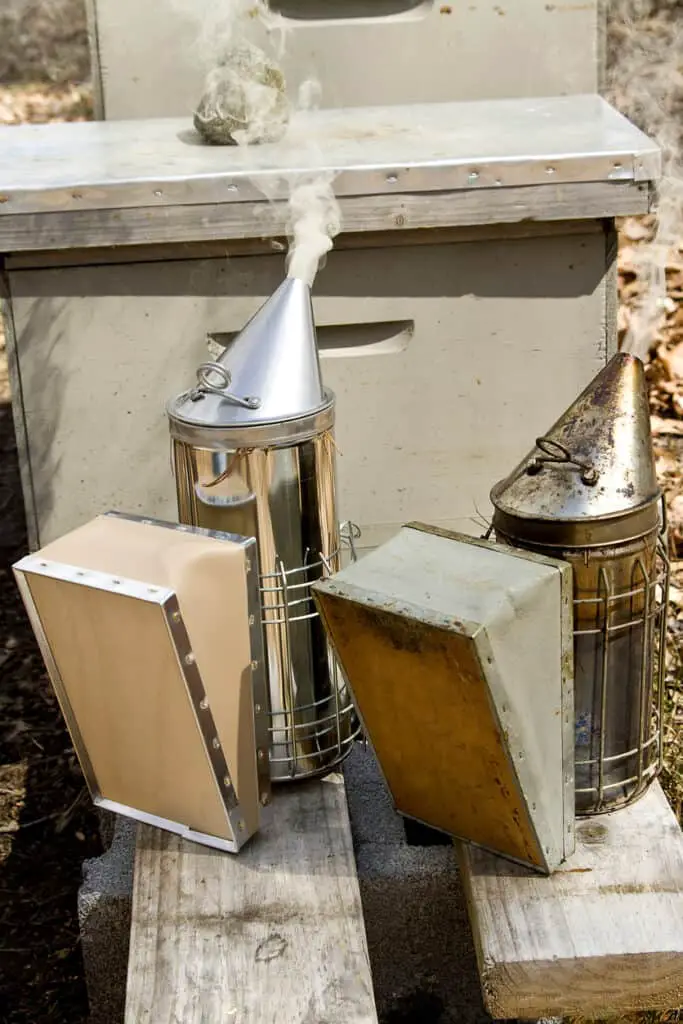Robbing bees are what they sound like. During nectar shortages, bees from other colonies try to get into your hives and steal your bees’ honey! These bees will fight your bees, tear open their honey cells, and can cause some serious problems for your bee colonies. How do you stop robbing bees?
You can stop robbing bees by looking for signs, narrowing the hive entrance, using a bee smoker, relocating weaker hives, and trying to disguise the hive entrance altogether. You can also stop robbers with water, open other hives in your apiary, and use Vicks vapor rub around the hive entrance.
Although it can seem impossible to stop a robbing frenzy halfway through, if you know what signs to look for, you may be able to stop and possibly prevent it. Continue reading with us as we discuss the signs of robbing bees, their dangers, and how you can stop them!
Know The Difference Between Robbing And Normal Behavior

During the nectar flow season, a busy beehive will have lots of activity at the entrance. Still, foraging bees’ behavior looks much different from robbing behavior. Foraging bees will go out and about with a purpose. They will fly straight out of the hive and go on their way.
Returning forager bees will be weighed down with pollen and nectar and land solidly when they return to their hive.
Some bees bear such a heavy load that they underestimate the entrance and crash land just under the bottom board.
At other times, the normal activity at your hive’s entrance may look oddly busy. This is when all the younger worker bees take their orientation flights.
Facing the hive, they will hover up and down and back and forth. They orientate themselves to the location of their hive.
You may notice hundreds of these younger bees floating all around the hive and the front of the hive, but there will not be any signs of aggression in their exploratory behavior. They are simply going about their natural activities.
Creating a solid contrast to these everyday busy-bee situations, robbing causes an aggressive and sinister look. You can’t prevent or try to stop robbing if you don’t know it’s happening.
You should always keep a close eye on your bees and hives and look for unusual activities, especially if you’re already having problems with a nectar shortage.
Try to recognize these warning signs:
Signs Of Fighting

Robbing bees will approach a hive without being weighted down by nectar. Robbing bees may not shoot right into the hive entrance, but instead, they will fly to the side of the hive, waiting for their opportunity to sneak past the guarding bees.
If you look closely at your hive, you may see some bees fighting at the entrance or on the ground at the front of the hive. The bees will combat, and the guard bees will defend their colony to death.
If you notice this is happening, you can take this behavior as a sure sign of robbing. You may also see bees rolling around in groups or pairs on the landing board or in the air.
Unusual numbers of dead bees outside or inside the hive can also indicate that you have a robbing problem. Look closely for bees that look black and shiny instead of furry.
This happens when bees lose their hair in a fight.
Unlike foraging bees that will leave their hive empty-handed, robbing bees will leave the hive loaded full of honey.
This could make it more challenging for them to fly, and some robbing bees will tend to climb to the front of the hive before flying off.
Once the robber bees are airborne, there is a characteristic dip in how they fly.
Signs Of Invaders
Robbing bees can often be spotted crawling on the seams and the cracks on the outer parts of the hive. This is what they do when looking for a way into your hive.
Wasps often fly along with robbing bees, so you need to be vigilant if you see them hanging out close to your hive. Much like wasps, robbing bees will sway from one side to the other while they sit in the hive, waiting for their chance to enter.
Unlike normal, hard-working worker bees, robbing bees won’t ever be seen carrying nectar or pollen on their legs when they enter a hive.
Robbing bees are also much louder than normal bumblebees, so it is a very bad sign if you notice your hive is suddenly humming with activity.
On top of the landing board or inside the hive, you may see pieces of wax comb that have been torn off to access honey.
How To Get Rid Of Robbing Bees

It is in bees’ nature to get very defensive in a hurry. Because the odor of alarm pheromones increase, bees will rush out of their hives looking for the reason for the attack. In a confusing situation, bees will start stinging everything around the hive.
More and more bees in defensive mode will join the party. The condition can become so severe if the pheromone drifts further and further away and rouses any nearby colonies, they will also become defensive.
If you live in an urban or urban area, this is bad news, and your good name as a beekeeper is in jeopardy. A situation like this could cause stinging occurrences in surrounding backyards and even streets.
Therefore, robbing activity is seen as a massive danger to your neighbors and your poor bees.
If you start noticing any of these above signs in your hives, you should immediately take action and stop it very fast. Then, you can take preventative measures to make sure it will not continue.
Use A Bee Smoker
Upon noticing signs of robbing bees, immediately smoke your hives to mask the alarm pheromones of your bees.
The smoke of a bee smoker will not harm your bees. It will just interfere with their sense of smell, so they will not be able to react to the alarm pheromones.
The robbing will continue, but you will confuse the bees enough to reduce their defensive behavior and stop them from stinging each other and possibly, you.
This is an excellent first step, and it is advised that you start with a bee smoker when the bees start to get out of hand due to robbing bees.
Narrow The Entrance Of Your Hive
Robbing becomes more and more coming during a nectar shortage, and you can often prevent or stop it by restricting the entrance of the hives.
This will work because your bee colony has a much greater chance of defending a smaller opening than a bigger one. However, this may not be enough with very small or weak bee colonies.
You can narrow the entrance of your hive by using pieces of grass or screen and pieces of wood. You can also purchase entrance reducers, as they work well and are inexpensive.
Close any gaps between boxes or extra holes. Ideally, you only want one small entrance to your hives until you can notice things are starting to settle down.
Close All Entrances Down Completely
If the above tactic doesn’t work very well, you might have a weak or smaller bee colony on your hands. You can then consider leaving all the entrances closed until things calm down.
The robbing bees will continue to try to find an opening in the targeted hive, but when they cannot gain access, they will eventually give up and fly away. When things have returned to their original state, you can re-open the entrance to your hives, but you still need to leave the robbed hive closed.
You will need to provide this bee colony with some time to regain its strength for several days or longer.
Relocate Your Weaker Hives
If you have another space available a couple of miles away, it might be your best bet to close your hive entirely and take it away. However, if you do not have this option, you can move the hive under attack within the apiary and place a saucer of honey in its space.
Robbing bees have a tendency to keep attacking a hive until they have taken away every last drop of available honey they can reap from their victims. Placing a small amount of honey there will convince them that they still rob the beehive.
If you are lucky enough to have other beekeeper friends, you can move your weaker hive to another beehive. Keeping smaller colonies away from locations with large colonies is always a good and effective idea.
However, most beekeepers do not have this option. It would be best to remain extra vigilant to keep the small entrances on these splits or hives. Also, keep in mind that preventing robbing bees is much easier than stopping one.
Disguise The Entrance Of The Beehive
You can use a damp towel to stop robbing bees. Many experienced beekeepers use this method, as it is tried and tested!
Hanging a damp bath or an old towel over the front of a beehive, which includes the entrance, will discourage the invading robbing bees when a hive is under attack.
The resident bees will figure out how to get behind the towel and will still be able to enter their hive.
Most of the robbing bee attackers will fly and fuzz around in front of the hive, unable to find the entrance.
Although an old bath towel will work just fine, it is advised to use a canvas drop cloth cut into half for this method.
Use Water To Stop Robbing Bees
Another method that lots of beekeepers use to slow down robbing is the sprinkler method. You are all set if you have a water sprinkler with a waterfall setting!
You can use this setting to rain down on the victim hive. This will cause robbing bees to return home. This method will also provide you, as the beekeeper, with some time to get control over the situation.
However, you will still need to take preventive measures, or the robbing bees will return and start their robbing all over again in the morning.
Open Some Of The Other Hives In The Apiary
Some beekeepers will consider opening some of the other hives in their apiary to stop robbing bees. This will force the bees of each hive to rush to the robbing bees to defend their territory.
However, the problem with using this strategy is that it assumes the robbing bees are from the same apiary, which might not always be the case.
If the robbing bees are from elsewhere, you risk causing more problems.
Apply Some Vicks Vapor Rub Around The Hive Entrance
This may sound strange, especially if you have never heard of doing this with your hives. Applying Vicks vapor rub to the entrance of your hive will allow you to mask the scent of the hive, which will confuse the robbing bees.
The natives won’t suffer this confusion, and they will still be able to make their way into their hive.
How Can You Prevent Robbing Bees In The First Place?
When it comes to robbing bees, prevention is always better than cure. It is always better to altogether avoid robbing than to be forced to fight off invaders.
Although it is impossible to always stop it, there are some measures you can take to avoid attracting robbing bees to your hives.
Use Entrance Reducers
You can trust your colony to put up one huge fight! The most important factor determining if they will successfully defend their territory is the total surface area they have to defend.
This is one of the primary reasons why using an entrance reducer is one of the most popular things used with new hives, such as when a package of bees is newly introduced.
By limiting the space at the front with an entrance reducer, fewer bees will have an increased chance of effectively defending themselves against the attack.
You can put the entrance reducers in place during a nectar shortage. When the hive entrance is smaller, your bees can more easily defend their hives from the robbing bees. This will be ideal if you have a weaker bee colony.
Check That Your Hive Has A Queen
Check that your hive has a healthy queen actively laying eggs. Beehives without queens become weak and tend to be much more susceptible to robbing.
If you notice your hive is missing a queen, you need to act fast. You can purchase a queen and introduce her to the hive, which will not only save the beehive altogether, but it will be able to regain some well-needed strength!
Provide Your Bees With Enough Food
Always make sure that there is more than enough food for your bees.
If you think that there is a lack of nectar sources at any given time, you can set up a bee feeder and give your bee colonies some sugar syrup. It would then be best to set up a feeder inside your beehives to reduce the smell from reaching any potential robbing bees.
Refrain From Opening Weak Hives During Nectar Shortages
If you know that you have a small or a struggling colony, you should not carry out your hive inspections. Instead, it might be best to open the hive only to fit a feeder and immediately close it.
Opening a beehive will release countless scents into the air, including the attractive smell of honey! A beekeeper setting a frame full of honey aside in the open is guaranteed to attract robbers.
However, if you need to get into your beehive, you can be very quick about it. It would be best that the time the hive is open is kept to the absolute bare minimum.
Work with your colones one by one, carefully and quickly. It may turn into a good idea for you to work with your beehives late in the afternoon, just as your bees stop flying.
Combining A Weak Bee Colony With A Strong Bee Colony
You can consider combining one of your weakest colonies with a stronger hive before a nectar shortage begins. As long as one of these hives has a queen, you can combine them to make them stronger and more resistant to robbing.
You can identify the stronger colony of the two, smoke and open the weaker colony, and at the same time smoke and open the stronger hive.
Take the hive body from the weak bee colony, and place it directly on top of the stronger colony’s hive.
Plant Blooms For Nectar Year-Round
If you have some extra space left in your garden, you can help your bees some more during the challenging times of the year.
You can grow honey plants, which thrive between all seasons and do not mind a bit of drought.
You can also plant some very popular garden plants, such as Lavender and Thyme, which are attractive to pollinators, especially to your honeybees!
Practice Good Hive Hygiene
Always try to be as hygienic as possible for your beehives. Look out for the small things, like leaving around any hive parts, such as discarded honeycomb or anything else that could be covered with syrup or honey.
The enticing scent of these treats will encourage robbers almost immediately. Be careful of spilling sugar water when refilling your feeders. Even a few tiny drops can attract robbing bees.
Make sure you collect any pieces of comb or wax and take them away from the hive area.
Avoid Using Entrance Or Open Feeders Near Beehives
When a few worker bees happen to fly into the sweet scent of syrup, they will fly closer to investigate. When this happens, they could catch another smell of honey from the hive next door to them, where the feeder is.
This also includes full supers during a honey harvest. It is always better to extract honey inside instead of leaving it out for robbers to discover. Always avoid entrance-type feeders in times of nectar shortage. Instead, an internal feeder would be your best bet.
However, when you refill your internal feeders, be cautious not to spill any syrup around the beehive, as it could cause a robbing frenzy.
Purchase A Robbing Screen
a robbing screen is a fixture you can buy at garden centers or your local hardware shop. However, if you are handy, you can make a robbing screen yourself. The main goal of a robbing screen is to trick the robber bees when they target a hive.
Because bees rely more on their sense of smell than their sight, they will follow a scent to the ends of the earth! When the robber bees get a whiff of the sweet smell. They will follow it to the hive entrance, but they won’t be able to enter.
They will be stopped by the screen placed in front of the hive. The inhabitant bees will still know their way around, and they will quickly figure their way in and out of the hive.
The robbing bees will get stuck trying to get through the screen, which gives the guard bees at the entrance a huge advantage. They will be able to fight the robbing bees effectively.
Conclusion
Robbing bees can not only be a huge hassle but can pose a severe threat to your hives. Suppose you are a beginner beekeeper and think you may have a robbing situation on your hands. If this is the case, it might be best to contact another local beekeeper to get some more information. Remember, prevention is better than cure, but don’t be too hard on yourself!

